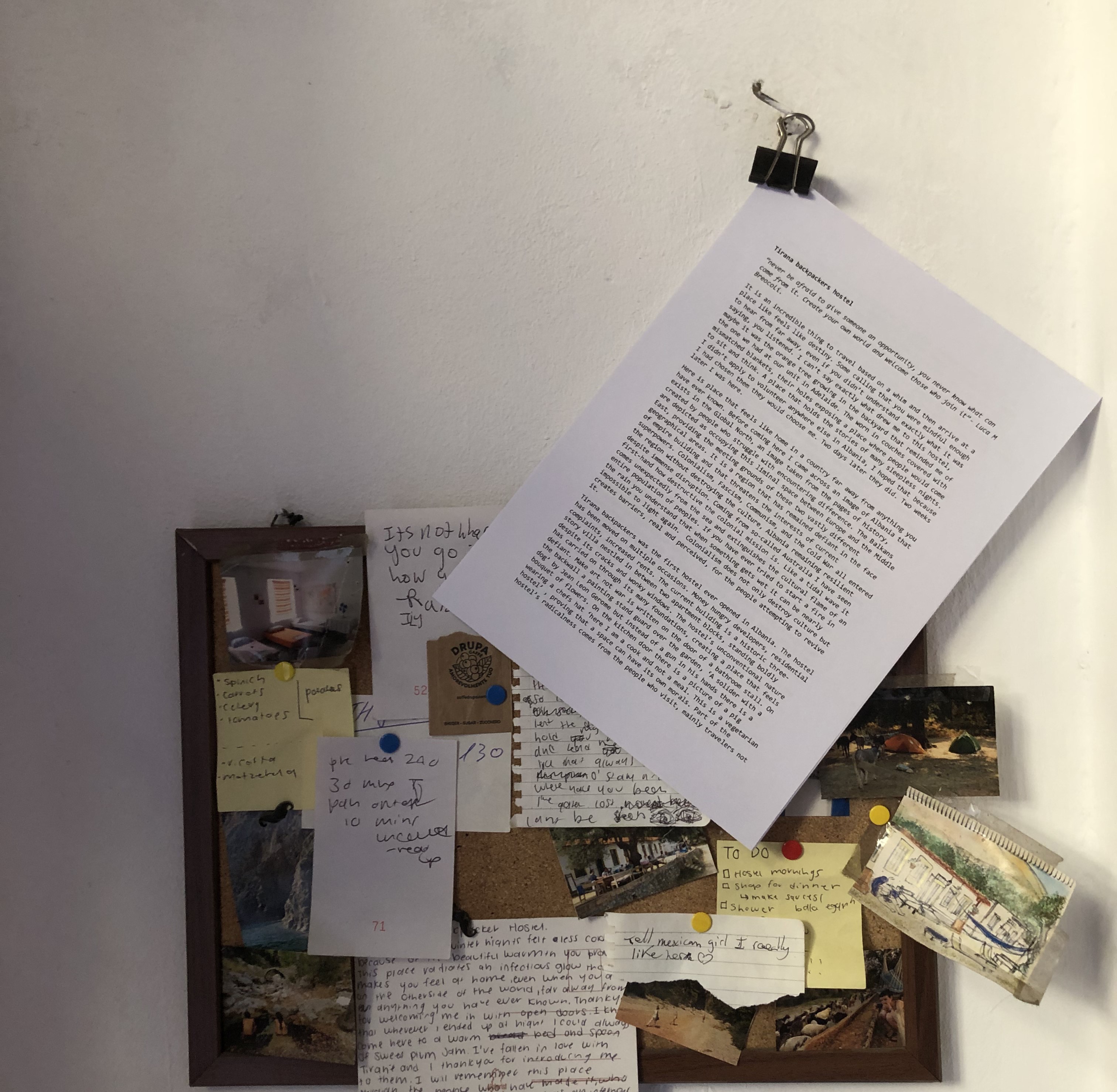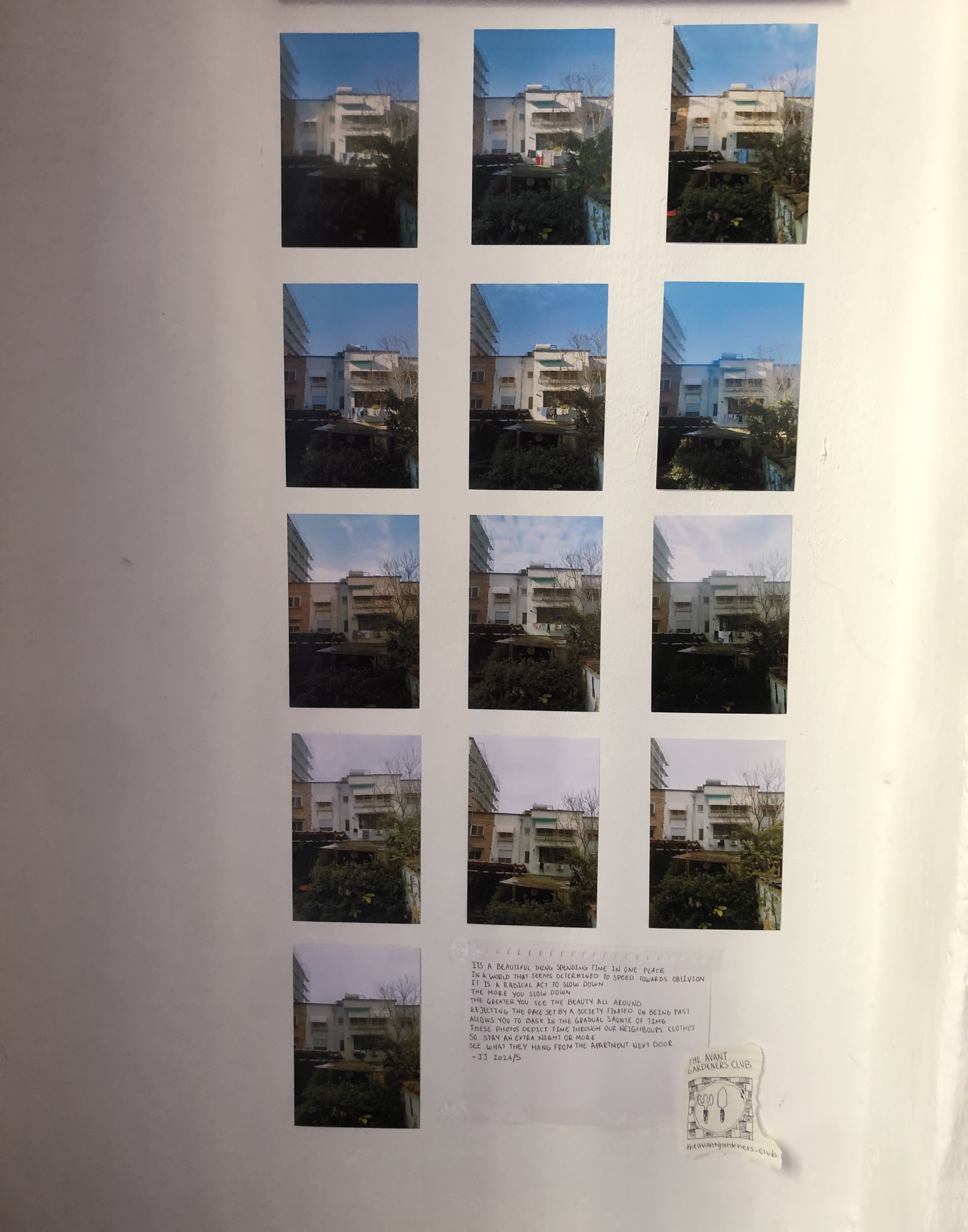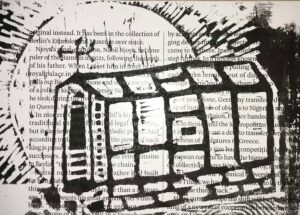

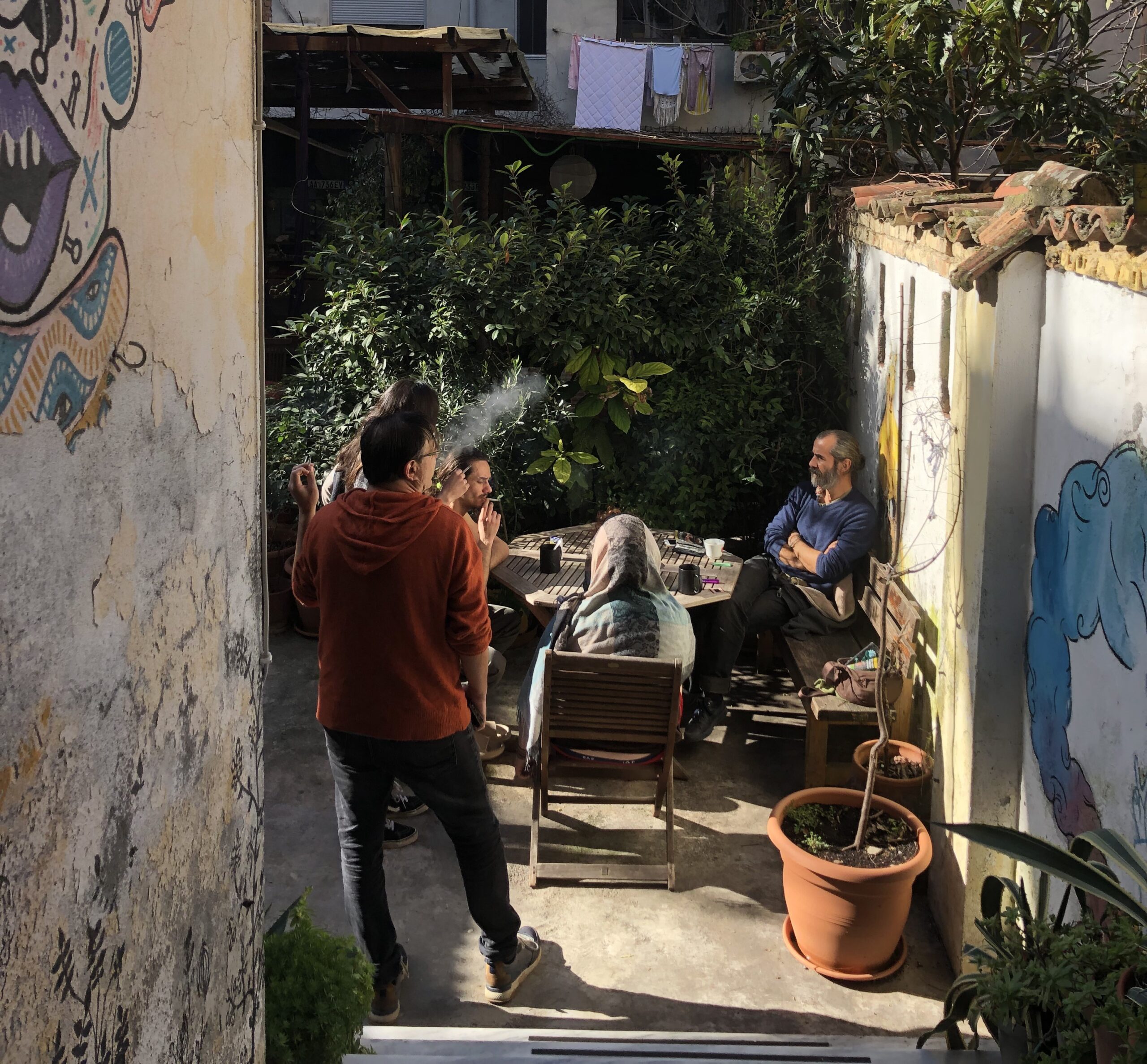
“never be afraid to give someone an opportunity, you never know what can come from it. Create your own world and welcome those who join it”- Luca M Breocoli.
It is an incredible thing to travel based on a whim and then arrive at a place like feels like destiny. Some calling that you were mindful enough to hear from far away, even if you didn’t understand exactly what it was saying, you listened. I can’t say exactly what drew me to this hostel, maybe it was the orange tree growing in the backyard that reminded me of the one we had at our unit in Adelaide. The worn in couches covered with mismatched blankets, their holes exposing a place where people would come to sit and think. A place that holds the stories of many sleepless nights. I didn’t apply to volunteer anywhere else in Albania, I hoped that because I had chosen them, they would choose me. Two days later they did. Two weeks later I was here.
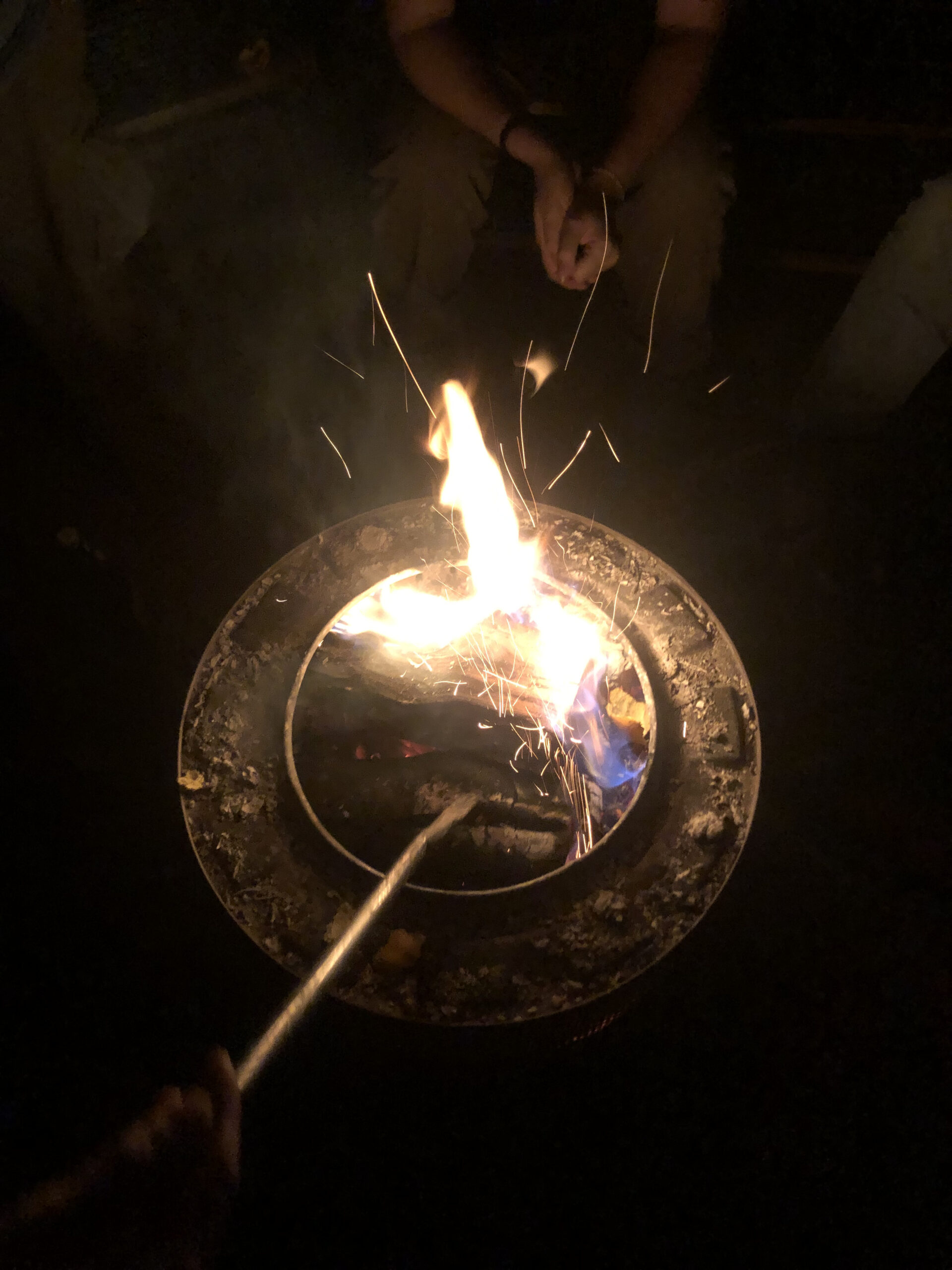
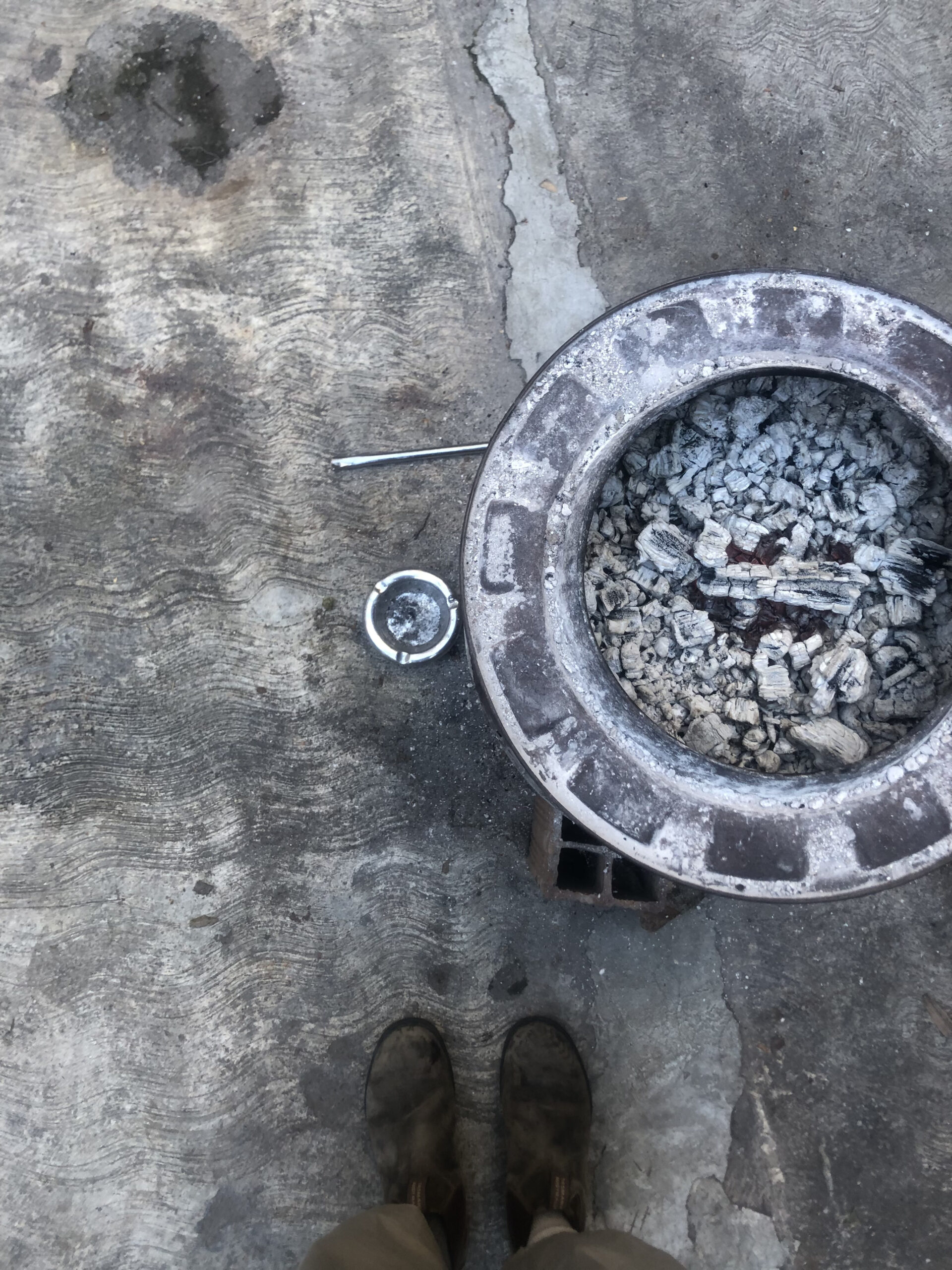
Here is place that feels like home in a country far away from anything you have ever known. Before coming here I came across an image of Albania that exists in the Global North, an image taken from the pages of history, created by people who struggle with encountering difference. The Balkans are depicted as occupying this liminal space between Europe and the Middle East, providing the meeting grounds of these two vastly different geographical areas. It is a region that has remained defiant in the face of empire building and that threatens the interests of current superpowers. Colonialism, Fascism, Communism, and the Cold War all entered the region without destroying the culture, Albania remaining resilient despite immense disruption. Coming from so-called Australia I have seen first-hand how destructive the colonial mission is. Like a tidal wave it comes unexpectedly from the sea and extinguishes the cultural flame of an entire population of peoples. If you have ever tried to start a fire in the rain you understand that when something gets wet it can be nearly impossible to light again. Colonialism does not only destroy culture but creates barriers, real and perceived, for the people attempting to revive it.
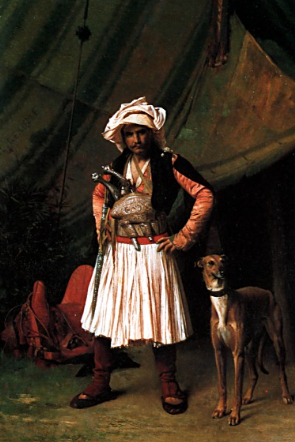
Tirana backpackers was the first hostel ever opened in Albania. The hostel has been moved on multiple occasions. Money hungry developers, residential complaints, increased rents. The current building is a historic three-story villa nestled in between two apartment blocks, standing boldly despite its cracks and wonky windows. The hostel’s unconventional nature has carried on through its many foundations, creating a place that feels defiant. Make art not war is written on the door of a bathroom stall. On the backwall a painting stand guard over the garden, ‘A solider with a dog’ by Jean Leon Gerome but instead of a gun in his hands there is a bouquet of flowers. On the kitchen door there is a picture of a pig wearing a chefs hat ‘here I am a cook and not a meal. This is a vegetarian hostel’ , proving that a space can have its own morals. Part of the hostel’s radicalness comes from the people who visit, mainly travelers not tourists. Albania has only been open for global tourism since the fall of the regime in the 1990s, its underground status attracts a subversive type of people who don’t just roam off the beaten track but have lost the map. Many of the guests have heard of this place through a friend, or a friend of a friend, or some guy they were seeing a month ago or a girl they just met at another hostel. It means that a lot of the people who come through here are of a similar mindset, they do not just pass through a place, they travel it.

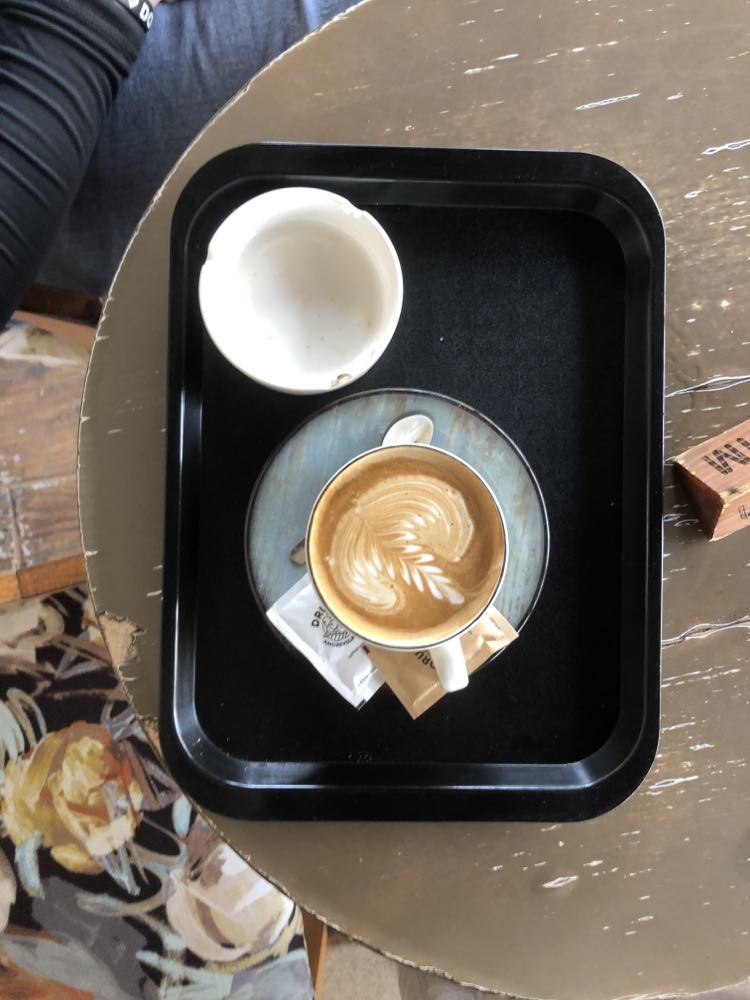
Due to the homogenized culture found in many parts of the west, people often struggle to appreciate the Balkans which contain a special blend of people, language, and religion. From this misunderstanding comes judgement. Simplistic stereotypes are used to imagine a place that is layered and complex. When I planned a trip to Macedonia, I had someone ask me ‘why? Isn’t it just the same as Albania?’. When we start using simplistic narratives to tell the story of a place we become complicit in the erasure of its culture. People who come from the Global North often describe things that are foreign to them as ‘uncivilized’ , throughout history this has justified imperial missions that continue today in other insidious ways. By labelling a place as ‘backwards’ it allows other countries to invade under the appearance that they are helping to bring a form of civilization, a type of ‘civilization’ that better aligns with their definition of the word. Entering Albania for the first time people often struggle with the cash-based economy ‘what do you mean I can’t use my card to pay for coffee?’. It seems to reflect a previous time, but our scale of time is relative to personal experience, and this experience informs our prejudice. In some ways the credit card culture we experience in the west, with its apparent convenience of apple pay, tap and go is making us regress. Less money goes to the places we want it to, more goes into the hands of greedy banks and conglomerates.
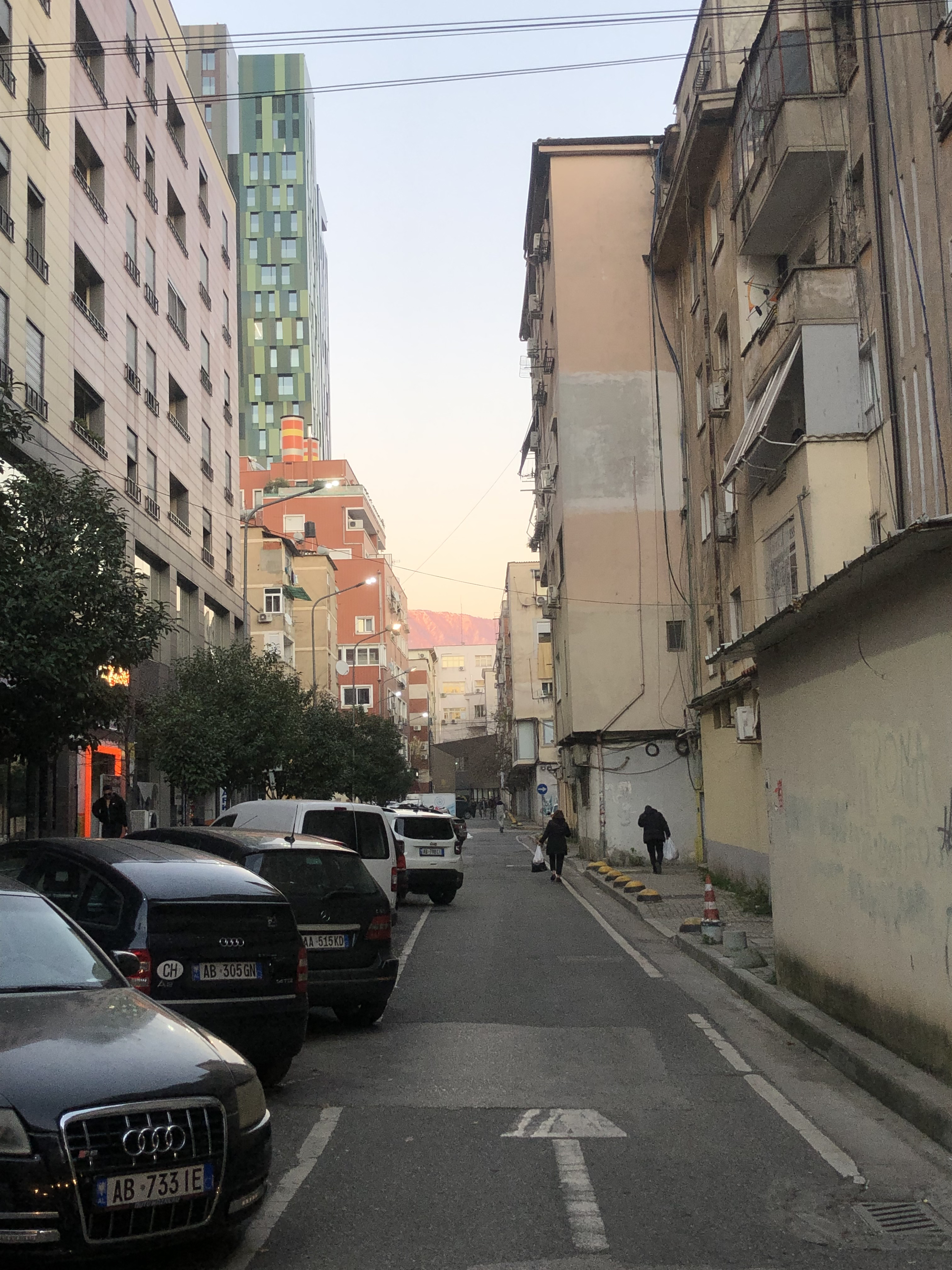
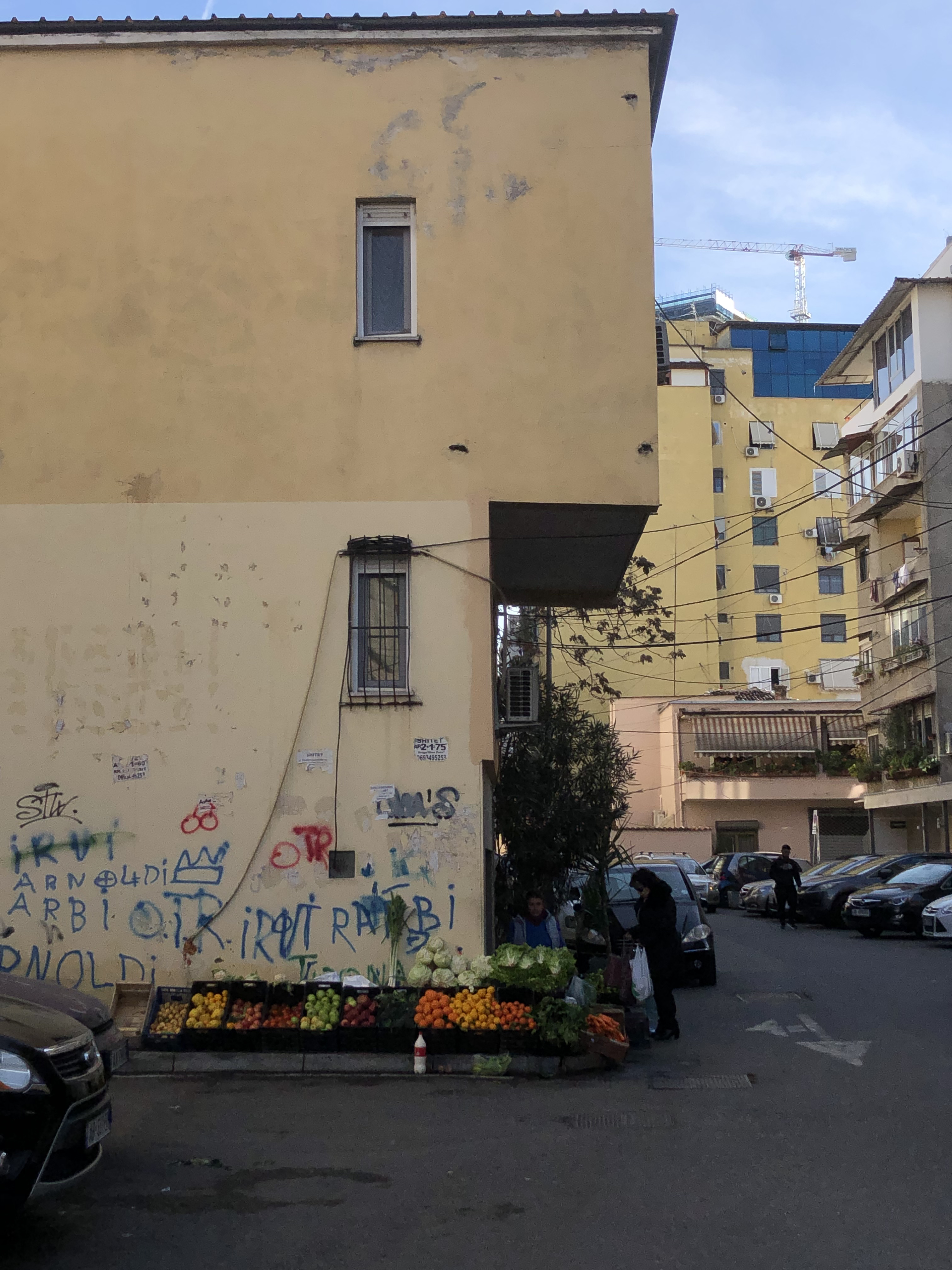
I will watch tourists with headphones on walk down a street lined with market stalls totally oblivious to the trays filled with potatoes that still have dirt covering them, old ladies selling bunches of herbs that have just been picked from their garden, air full with the smell of freshly ground, plastic water bottles filled with home pressed olive oil and golden jars of liquid honey. I will watch tourists walk blindly down these streets on their way to the supermarket and then leave with a bag full of fruit covered in plastic and a packet of Italian coffee. Eri , a fellow volunteer at the hostel, once said to me that there are somethings you should never buy from the supermarket – honey, coffee, olive oil, fruit and vegetables. Initially I agreed because buying straight from the producer is always cheaper and the quality is always better. Latter I agreed because shopping from these multinational companies is offensive to this country’s way of life, a lifestyle that priorities buying fresh ingredients and supporting local producers. After being here for a month I have a person I go to for my fruit , my herbs, my vegetables, my cheese , my bread. Some of them recognize me by name others by face, some will give me an extra bunch of herbs or couple of pieces of fruit, but I know that all of them appreciate my decison to shop there instead of a supermarket. I’m unsatisfied if I don’t come back from shopping with at least 5 receipts, all written in different hand writing. Many people would read this and think of the past with its ‘simpler times’, I write this and realize how our ‘progressed civilization’ is making us simpler people.
Eri was describing the time he spent in Holland a few years ago, he said one of the biggest shocks was having to go to the supermarket for everything. Sterile floors replaced the worn concrete of winding alleyways, the fruit was covered in stickers that read like advertisements for foreign places – juicy apples from Brazil, sweet mangoes from Australia, people working the checkout wouldn’t remember your name because you were just another face amongst the sea of thousands they would serve that day, the honey had sugar added to it and the olive oil was diluted. In many was this lifestyle is much more ‘uncivilized’ that what you experience in Albania. While travelling you are reminded that there is no such thing as mainstream culture rather many divergent flows. When we start ranking the traditions of different countries, we end up projecting our prejudices at another place. You realize that the only thing that really separates up is perception. Unfortunately, our perception is easily manipulated, by other people, mass media, the culture we were raised in. The more we travel the greater we become at recognizing this manipulation and preventing it from affecting us.
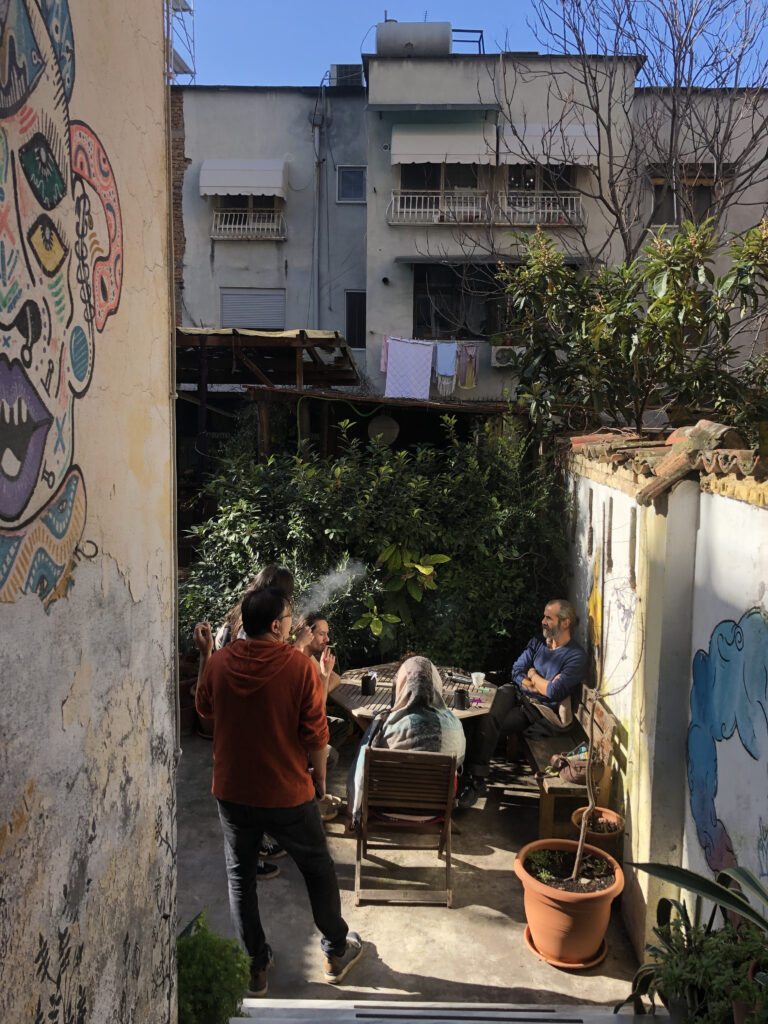
This is why hostels are important. They provide the meeting grounds for people from around the world, a public sphere where you can discuss ideas and air thoughts. Working at a hostel you feel like a conductor helping to orchestrate these moments of connection, recommending cafes for people to visit in the early hours, clubs to party at for late night adventures. The more I talked to others about Tirana the more I started to fall in love with the place, but it is the people who will always have my heart. I asked Illir one morning why did he decide to open hostel? he said it came to him like a dream , one day he woke up and realized that it is what he must do. Ilir’s personality touches every corner of the hostel, the mismatched furniture outside, homemade jam in the morning , the plants that occupy every corner, ledge and crevice inside and out, in the bright tapestries adorning the couches. He is a free-spirited guy who floats between here and his other hostel in Pellumbus leaving gifts of joy in his path. Some days it is a loaf of bread, the next a piece of wisdom. One night we were settled around a bonfire in the backyard, Ilir disappears for a few minutes and we hear rustling from above. Suddenly he appeared out of the dark, pockets stuffed with fresh mandarins so sweet and morish he had to climb the tree again.
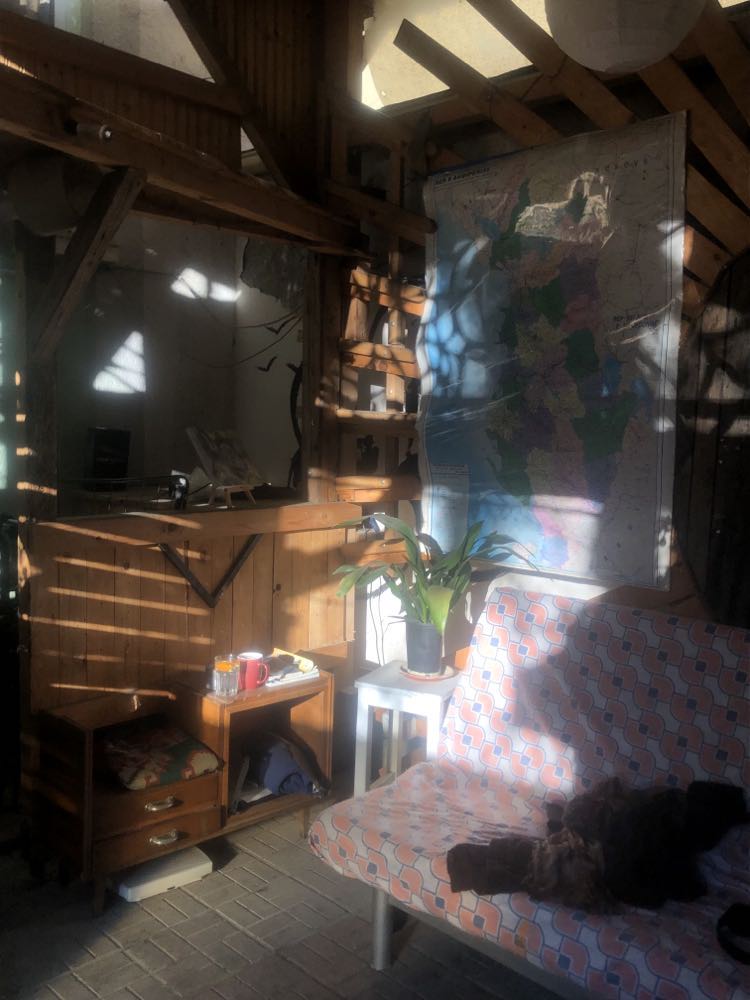
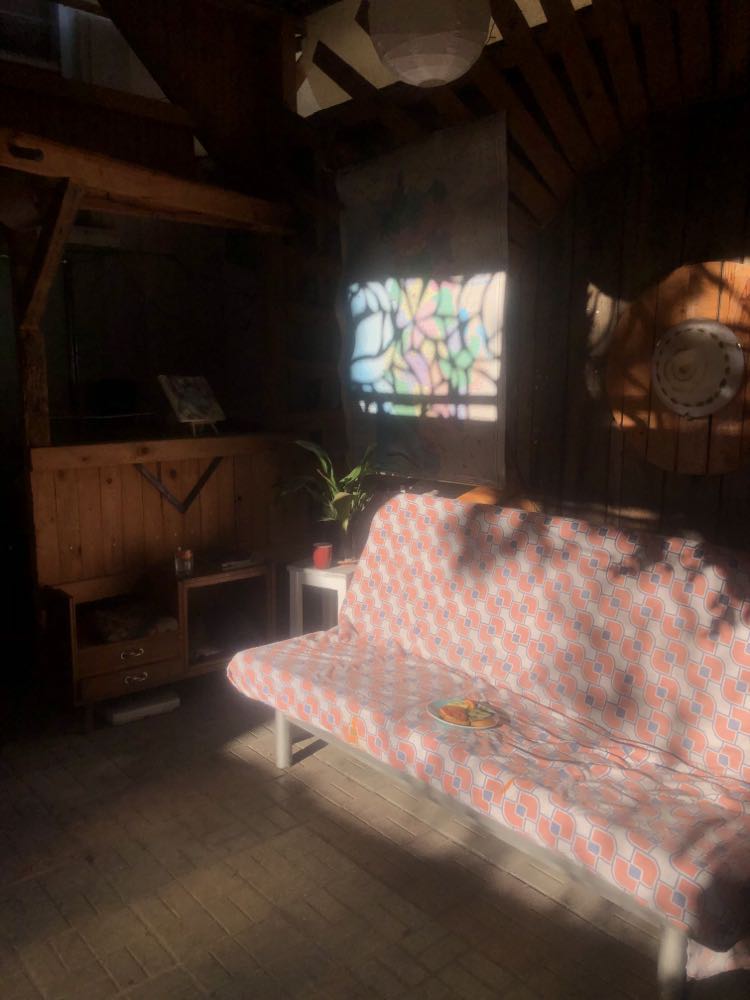
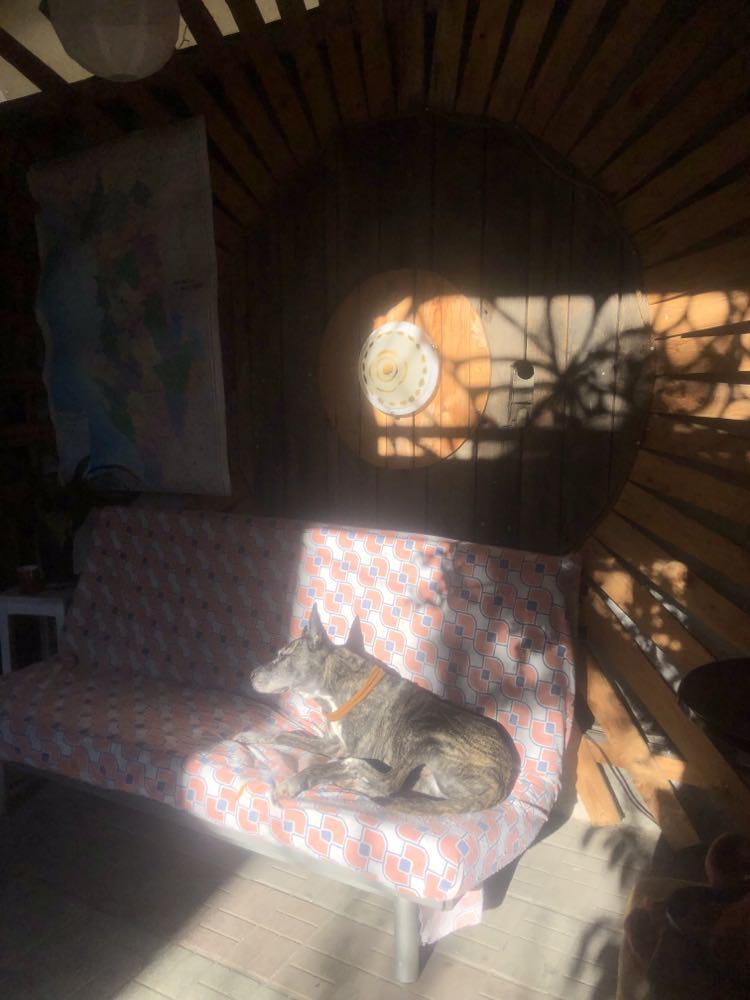
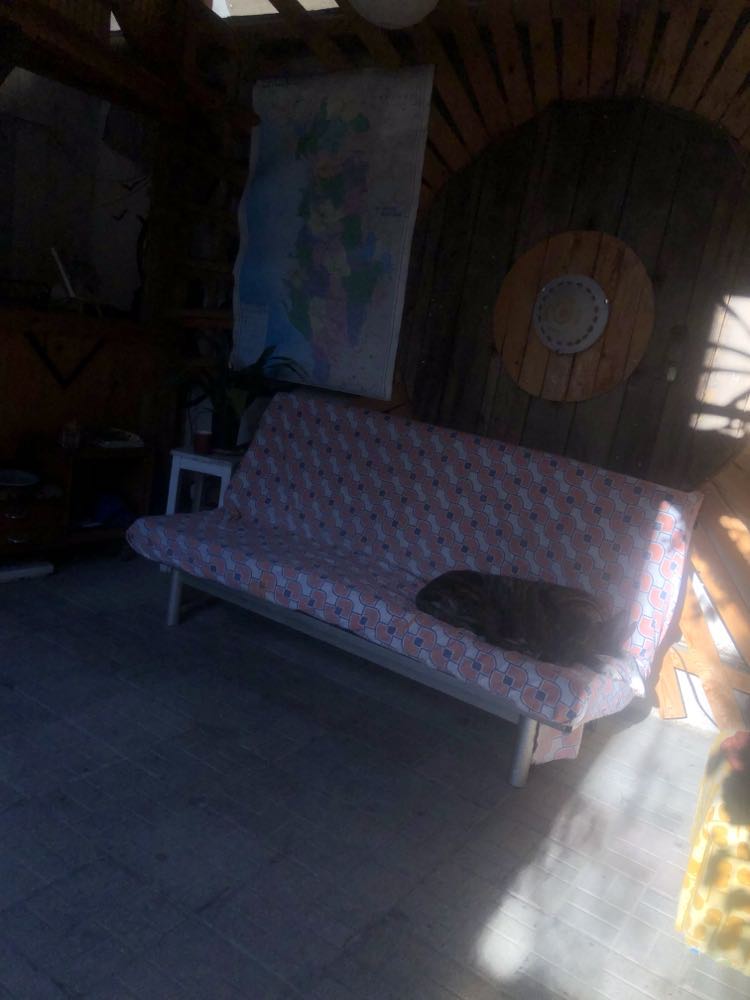
Illir is someone who can be summoned by light, you will find him in the sunniest spot during the morning and perched around the fire at night. He is not only drawn by light but helps create it , even in the middle of winter the hostel is infected with this contagious warmth. Riza the hostel dog is apart of this glow. She was born in the basement, and has lived here most of her life, one of the only constants in an otherwise transitory space. When Riza was a puppy she was all ears, even now they seem abnormally large, big ears so she can hear all the secrets of the hostel. Illir describes Riza as a ‘teacher’ and if you ever follow her in the mornings, you can understand why. The first shift at the hostel is my favorite, they make the early rise worth it. In a place so full of life it is strange to hear the silence that accompanies the early hours. The quiet is broken as soon as you walk onto the street to buy the ingredients for breakfast. Fresh bread from the Turkish bakery still warm from the oven, fruit and veg from the lady down the alleyway who doesn’t speak English but communicates in grins and gestures, maybe some cheese or eggs from Bulmet. After preparing breakfast for everyone else my next task is to find some sun for me. Riza acts as a guide, dogs always know the best spots. At 9 you will find her lazing on a couch out the front, soaking up the first rays of light. After cleaning up breakfast you can find her (or Illir and Eri) sitting out the back, having followed the sun through the hostel.
One night we were sitting outside watching the full moon rise ‘they left us some sky’ Illir says looking apprehensively at the skyscrapers that are closing in on this little patch of paradise. There are plans to tear the hostel down and build an apartment in its place. The worn façade that has the stories of time passing written all over it does not fit in with the streets trend towards ‘modernity’. I know that if this happens, they will move again, like Albania – remaining resilient despite the threats to its culture, the assault against anything that is different, the constant pressure to homogenize. I won’t remember the hostel as a building but a person with its own character and light. There is an eternal flame burning here that will never go out. If you have enough people come together it is possible to start a fire even when it’s raining.
The washingline next door
